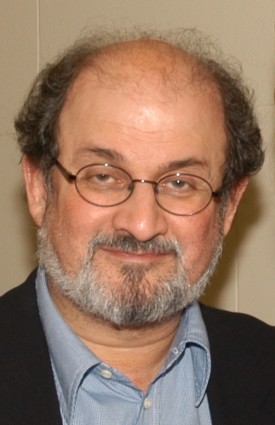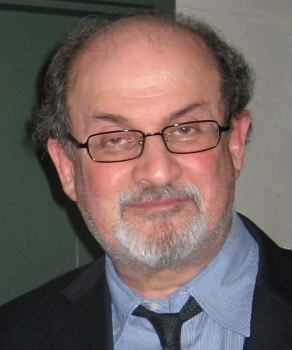Sir Iqbal Abdul Karim Mussa Sacranie, OBE (born 6 September 1951 [1] in Malawi) served as Secretary General of the Muslim Council of Britain (MCB) until June 2006. He arrived in the UK in 1969. He was the founding Secretary General of the Muslim Council of Britain (established 1997), and served four further years as Secretary General from 2002 to 2004 and 2004 to 2006. He was honoured with an Officer of the Order of the British Empire (OBE) in 1999, and was Knighted by the Queen in 2005. [2]
During the controversy on Salman Rushdie, shortly after the fatwa by Iranian religious leader Ayatollah Khomeini for his book The Satanic Verses , Sacranie stated: "Death, perhaps, is a bit too easy for him his mind must be tormented for the rest of his life unless he asks for forgiveness to Almighty Allah." [3] Sacranie states that this quotation was misinterpreted and that he merely wanted to convince Muslims that they should not kill Rushdie. [4]
On 3 January 2006 Sacranie told BBC Radio 4's PM programme that he believes homosexuality is "not acceptable", and denounced same-sex civil partnerships as "harmful". He said that bringing in gay marriage did "not augur well" for building the foundations of society. [5] [6] [7]
He was Chairman of Muslim Aid and since 2012 is on the executive committee. [8]

Ruhollah Khomeini, also known as Ayatollah Khomeini, was an Iranian political and religious leader who served as the first supreme leader of Iran from 1979 until his death in 1989. He was the founder of the Islamic Republic of Iran and the leader of the 1979 Iranian Revolution, which saw the overthrow of Shah Mohammad Reza Pahlavi and the end of the Persian monarchy. Following the revolution, Khomeini became the country's first supreme leader, a position created in the constitution of the Islamic Republic as the highest-ranking political and religious authority of the nation, which he held until his death. Most of his period in power was taken up by the Iran–Iraq War of 1980–1988. He was succeeded by Ali Khamenei on 4 June 1989.

Sir Ahmed Salman Rushdie is an Indian-born British-American novelist. His work often combines magic realism with historical fiction and primarily deals with connections, disruptions, and migrations between Eastern and Western civilizations, typically set on the Indian subcontinent.

Sayyid Ata'ollah Mohajerani is an Iranian journalist, author, and reformist politician. Mohajerani served as Minister of Culture and Islamic Guidance of Iran under President Mohammad Khatami from 1997 until 2000 when he was resigned from office for alleged permissiveness." He wrote a book about Salman Rushdie, and defends the Fatwa to kill him; he is living as a UK citizen.

The Satanic Verses is the fourth novel of British-Indian writer Salman Rushdie. First published in September 1988, the book was inspired by the life of the Islamic prophet Muhammad. As with his previous books, Rushdie used magical realism and relied on contemporary events and people to create his characters. The title refers to the Satanic Verses, a group of Quranic verses about three pagan Meccan goddesses: Allāt, Al-Uzza, and Manāt. The part of the story that deals with the "satanic verses" was based on accounts from the historians al-Waqidi and al-Tabari.

The Islamic Party of Britain is a defunct political party in the United Kingdom that was active from its formation in 1989 until 2006. The IPB was opposed to both capitalism and communism. David Musa Pidcock, a Sheffield man who converted from Roman Catholicism to Islam while working as an engineer in Saudi Arabia, founded and led the party. The IPB published a quarterly magazine entitled Common Sense.

Grand Ayatollah Mohammad Fazel Lankarani was an Iranian Twelver Shia Marja'. He was student of Grand Ayatollah Borujerdi. He was a child of a Persian mother and an Azerbaijani father.

The Muslim Council of Britain (MCB) is a national umbrella body with over 500 mosques and educational and charitable associations affiliated to it. It includes national, regional, local, and specialist Muslim organisations and institutions from different ethnic and sectarian backgrounds within major parts of, but not all, British Islamic society.

Hitoshi Igarashi was a Japanese scholar of Arabic and Persian literature and history and the Japanese translator of Salman Rushdie's novel The Satanic Verses. He was murdered in the wake of fatwas issued by Ayatollah Ruhollah Khomeini of Iran – who, by the time of Igarashi's murder, had died – calling for the death of the book's author and "those involved in its publication." His murder remains unsolved.
The Festival of Muslim Cultures, a national celebration of Muslim cultures held in the United Kingdom, began in January 2006 and ended July 2007. It imitated an earlier event in 1976.

William Nygaard is the retired head of the Norwegian publishing company Aschehoug. He was also chairman of the Norwegian Broadcasting Corporation. He has two children.
Iran is a constitutional, Islamic theocracy. Its official religion is the doctrine of the Twelver Jaafari School. Iran's law against blasphemy derives from Sharia. Blasphemers are usually charged with "spreading corruption on earth", or mofsed-e-filarz, which can also be applied to criminal or political crimes. The law against blasphemy complements laws against criticizing the Islamic regime, insulting Islam, and publishing materials that deviate from Islamic standards.

The Satanic Verses controversy, also known as the Rushdie Affair, was a controversy sparked by the 1988 publication of Salman Rushdie's novel The Satanic Verses. It centered on the novel's references to the Satanic Verses of the Quran, and came to include a larger debate about censorship and religious violence. It included numerous killings, attempted killings, and bombings by perpetrators who supported Islam.

In mid-June 2007, Salman Rushdie, the British-Indian novelist and author of the novel The Satanic Verses, was created a Knight Bachelor by Queen Elizabeth II. Soon after the news of the knighthood was released protests against the honour were held in Malaysia and in Pakistan where effigies of the writer were publicly burnt. On 19 June 2007, governments in both Pakistan and Iran summoned their British ambassadors to officially protest against the award. While many groups and individuals have renewed the call to execute Rushdie, the author "is not commenting on the latest threats to his life. It is understood he is anxious not to inflame the situation". When asked by the Associated Press if his silence was at the request of the British government, Rushdie replied by e-mail stating "The British authorities have not asked me to do or not do anything. I have simply chosen to remain out of this storm for the moment. And nobody is turning anything down." The media noted in July 2007 that Rushdie "has not been seen in public since the 16 June announcement of his knighthood." However, he was photographed receiving his knighthood formally the next year at a ceremony which, breaking with tradition, was not announced in advance of his attendance.
Following Ayatollah Khomeini's 14 February 1989 death fatwa against author Salman Rushdie, after the publication of Rushdie's novel The Satanic Verses, Yusuf Islam, made statements endorsing the killing of Rushdie. His statements generated criticism from commentators in the West.
International Guerrillas is a 1990 spy action film from Pakistan, originally released in the context of the Satanic Verses controversy. The movie portrays Salman Rushdie as its main villain. The film was made in the Urdu language; it also features several musical numbers including songs and dances.

A Brief History of Blasphemy: Liberalism, Censorship and the Satanic Verses is a 1990 book by Richard Webster, in which the author discusses the controversy over Salman Rushdie's novel The Satanic Verses (1988). Webster critiques the freedom to blaspheme, and argues against The Crime of Blasphemy.
The Blasphemers' Banquet is a film-poem created in 1989 by English poet and playwright Tony Harrison which examines censorship arising from religious issues. It was created in part as a response to the Salman Rushdie controversy surrounding his publication of The Satanic Verses. It was aired by the BBC 1's programme Byline on 31 July 1989.
Islamism has existed in the United Kingdom since the 1970s, and has become widely visible and a topic of political discourse since the beginning of the 21st century.

On August 12, 2022, a man stabbed novelist Salman Rushdie multiple times as he was about to give a public lecture at the Chautauqua Institution in Chautauqua, New York, United States. A 24-year-old suspect, Hadi Matar, was arrested at the scene, and was charged the following day with assault and attempted murder. Rushdie was gravely wounded and hospitalized. Interviewer Henry Reese was also injured by the attacker.